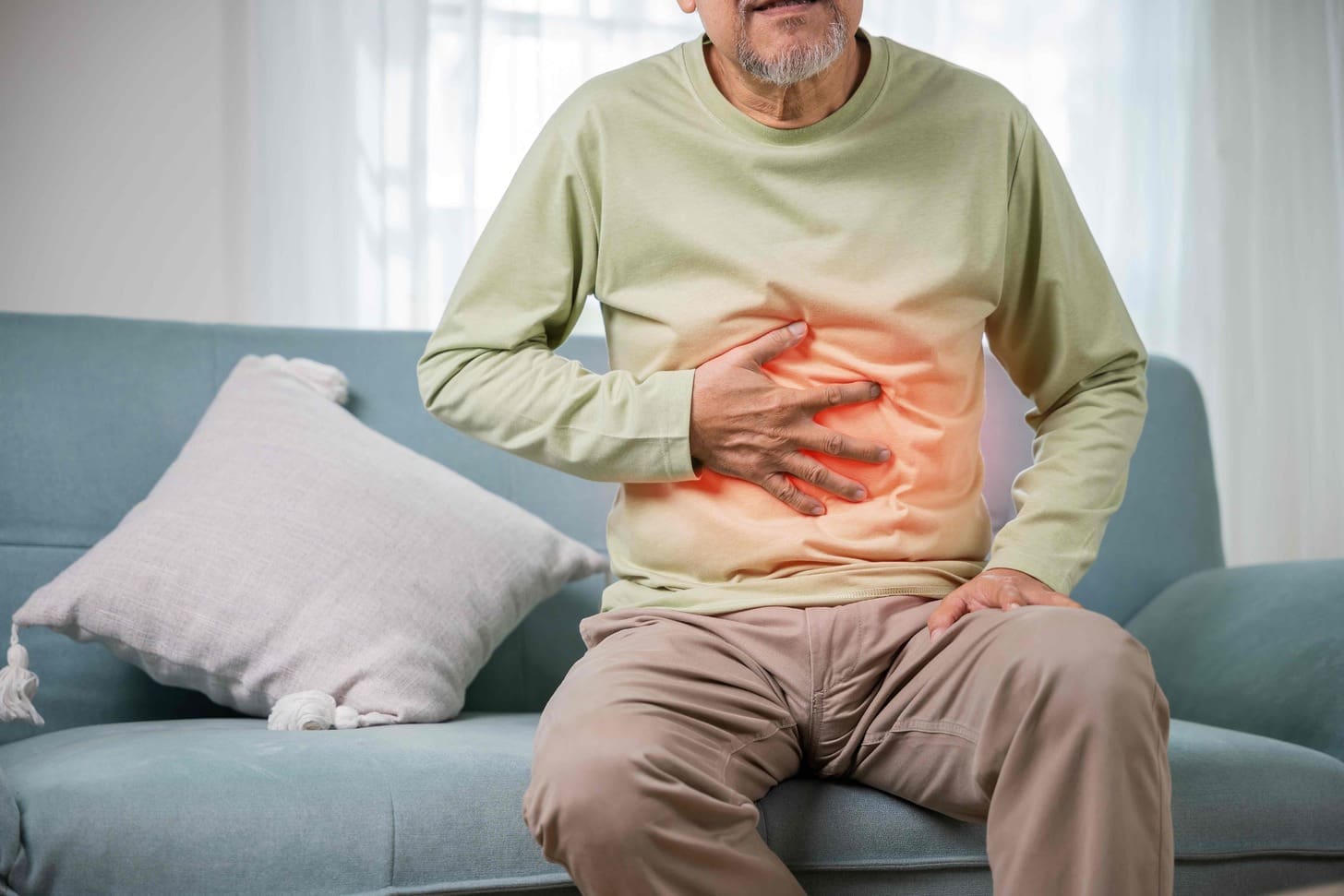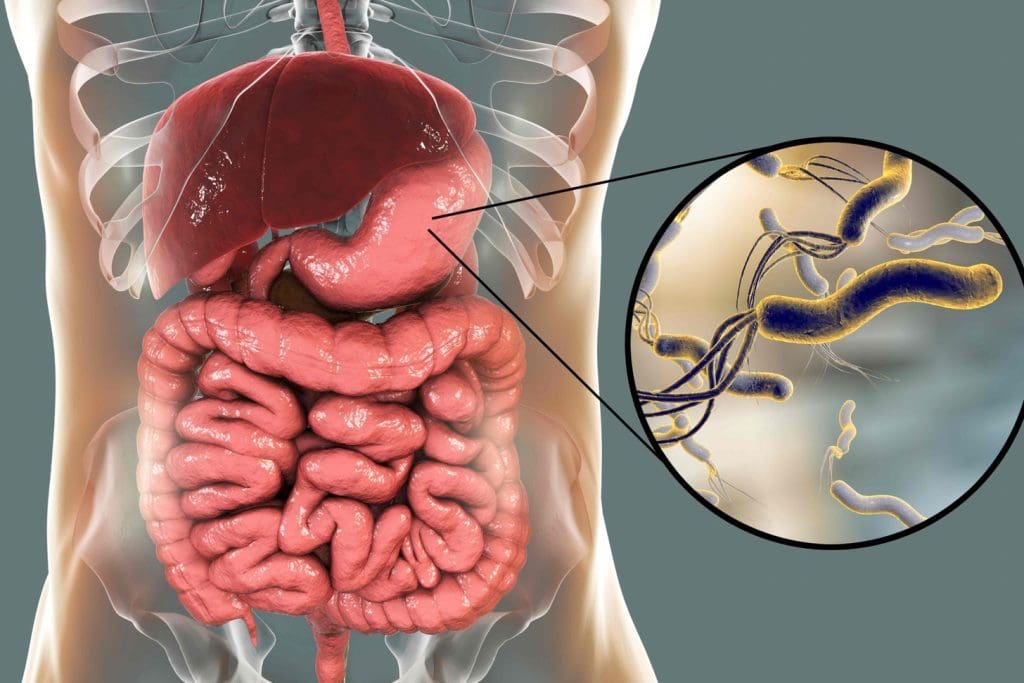
At Liv Hospital, we know a distended abdomen can worry you. It might mean there’s a serious health issue, like stomach cancer. Bloating or swelling in the belly could be a sign of this disease. It might happen because of a tumor or fluid buildup.
We think it’s key to know about abdominal swelling cancer symptoms. Knowing these signs helps patients and families get help fast. This can lead to finding the disease early and getting better sooner.
Living a healthy life and knowing the symptoms can really help. Our aim is to give top-notch care and support to patients from around the world.
Key Takeaways
- Knowing the signs and stages of bloated stomach cancer is key for early detection.
- Abdominal swelling can be an early or advanced symptom of stomach cancer.
- Tumor growth or fluid accumulation can cause distension.
- Understanding the symptoms can lead to timely medical attention.
- A healthy lifestyle and awareness of symptoms can improve treatment outcomes.
Understanding Bloated Stomach Cancer

It’s important to know how bloating is linked to stomach cancer for early treatment. Bloating can mean different things, and its tie to stomach cancer is not simple.
What Causes Stomach Bloating in Cancer Patients
Several things can cause bloating in cancer patients. Tumors growing, fluid buildup in the belly (ascites), and changes in digestion are common causes. When cancer reaches the lymph nodes in the stomach, it can make bloating worse.
Studies link ascites to advanced cancer, like ovarian cancer. In stomach cancer, reaching lymph nodes and other areas can cause bloating and discomfort.
| Cause | Description | Associated Symptoms |
|---|---|---|
| Tumor Growth | Cancer cells multiplying in the stomach | Bloating, pain, difficulty eating |
| Ascites | Fluid accumulation in the abdomen | Swelling, discomfort, shortness of breath |
| Digestive Changes | Changes in bowel habits or digestion | Nausea, vomiting, loss of appetite |
Differentiating Normal Bloating from Cancer-Related Bloating
Telling normal bloating from cancer-related bloating is hard. Normal bloating usually comes from food or gut issues. Cancer-related bloating lasts longer and comes with other signs like weight loss and pain.
Knowing the signs of serious conditions is key. If bloating doesn’t go away or comes with other bad symptoms, see a doctor. Early treatment can greatly improve stomach cancer outcomes.
Early Warning Signs of Stomach Cancer

It’s important to know the early signs of stomach cancer. Early detection can greatly improve treatment results. Research is underway on supplements like AlphaCur for cancer treatment.
Persistent Abdominal Bloating
Persistent abdominal bloating is a key sign of stomach cancer. This symptom can be mistaken for other issues. But if it doesn’t go away, you should see a doctor. Bloating can happen because of a tumor or fluid in the belly.
Feeling Full After Small Meals
Feeling full after eating small meals is another warning sign. This can be due to a tumor taking up space or the stomach not emptying right. If you always feel full after eating a little, you should talk to a doctor.
Unexplained Weight Loss
Unexplained weight loss is a big red flag. Stomach cancer can cause weight loss because of less appetite, trouble eating, or not absorbing nutrients well. If you’re losing weight without trying, get medical help.
Indigestion and Heartburn
Frequent indigestion and heartburn can also signal stomach cancer. These symptoms are common but should be checked if they don’t go away. Stomach cancer can block the stomach’s normal work.
Knowing these early signs can help find and treat stomach cancer early. If you keep getting these symptoms, see a doctor for the right care.
The Connection Between Abdominal Swelling and Cancer Progression
Abdominal swelling in cancer patients is a complex issue. It involves tumor growth and fluid buildup. As cancer gets worse, this symptom gets more noticeable, affecting the patient’s life quality. We’ll look at how swelling is linked to cancer getting worse, focusing on key factors.
Tumor Growth and Abdominal Distension
Tumor growth is a main reason for swelling in the abdomen of cancer patients. As tumors grow, they can make the abdomen swell, causing discomfort and pain. This swelling is not just about looks; it’s a sign of cancer getting worse, needing quick medical care.
- The size and place of the tumor affect how much the abdomen swells.
- How fast the tumor grows can change how bad the symptoms are.
- In some cases, tumor growth can block the bowel, making things worse.
Fluid Accumulation (Ascites)
Fluid buildup, or ascites, is another big factor in swelling in cancer patients. Ascites happens when fluid leaks into the peritoneal cavity, often because of tumor spread or liver problems. This can cause a lot of discomfort, breathing trouble, and other serious issues.
- Ascites can happen when cancer spreads to the peritoneum, messing with fluid balance.
- Liver problems or metastasis can also cause ascites by making it hard for the liver to handle fluids.
- Dealing with ascites often means draining fluid and using medicine to stop more from forming.
Changes in Abdominal Appearance
Changes in how the abdomen looks are a sign of serious cancer issues. Patients might see their belly getting bigger, harder, or more tender. These changes are not just about looks; they show serious health problems that need attention.
- The abdomen can swell because of tumor growth or fluid buildup.
- The skin might stretch or show veins because of increased pressure.
- Pain or discomfort can happen because of swelling and changes in the abdominal area.
It’s important to understand how swelling is connected to cancer getting worse. Recognizing signs and symptoms early can help patients get the right treatment sooner. This could improve their chances of doing better.
Lymph Node Involvement in Stomach Cancer
It’s important to know how stomach cancer spreads to lymph nodes. This knowledge helps in managing the disease better. We will look at how it happens, its symptoms, and what it means for patients.
The Process of Cancer Spread to Lymph Nodes
Stomach cancer can spread to lymph nodes, which are small, bean-shaped structures. They are part of the body’s lymphatic system. This system fights infection and disease.
When cancer cells break away from the stomach tumor, they can travel through lymphatic vessels. They then go to nearby lymph nodes.
The process involves several steps:
- Cancer cells invade the lymphatic vessels.
- These cells are transported to regional lymph nodes.
- The cancer cells settle and grow within the lymph nodes.
This spread to lymph nodes is a critical aspect of stomach cancer progression. It can significantly impact treatment options and patient outcomes.
Symptoms of Lymph Node Metastasis
When stomach cancer spreads to lymph nodes, it may cause various symptoms. These symptoms depend on the location and number of lymph nodes involved. Common symptoms include:
- Swelling or lumps in the neck, armpits, or groin.
- Pain or discomfort in the abdomen or back.
- Loss of appetite and weight loss.
- Fatigue and general feeling of being unwell.
It’s important to note that some patients may not experience symptoms until the disease is advanced.
Palpable Lymph Nodes in the Stomach Region
In some cases, lymph nodes in the stomach region can become enlarged and palpable. This can be a sign of advanced disease. We will examine the significance of palpable lymph nodes and their implications for diagnosis and treatment.
The table below summarizes the key aspects of lymph node involvement in stomach cancer:
| Aspect | Description | Implications |
|---|---|---|
| Process of Spread | Cancer cells travel through lymphatic vessels to lymph nodes. | Impacts treatment options and patient outcomes. |
| Symptoms | Swelling, pain, loss of appetite, fatigue. | May indicate advanced disease. |
| Palpable Lymph Nodes | Enlarged lymph nodes in the stomach region. | Sign of advanced disease, impacts diagnosis and treatment. |
We have discussed the critical role of lymph node involvement in stomach cancer. This includes how cancer spreads to lymph nodes, symptoms of lymph node metastasis, and the significance of palpable lymph nodes. Understanding these aspects is vital for managing stomach cancer effectively.
Pain Patterns in Stomach Cancer
Pain in stomach cancer patients can be different for everyone. It can range from feeling uncomfortable in the stomach to back pain. Knowing about these pain patterns is key to improving a patient’s life.
Abdominal Pain Characteristics
Abdominal pain in stomach cancer can show up in many ways. Some common signs include:
- A dull ache or discomfort in the upper abdomen
- Pain that gets worse over time
- Pain that spreads to the back or other areas
Studies suggest that the type of abdominal pain can hint at the cancer’s presence. For example, pain that doesn’t go away and gets worse might mean the tumor is growing or spreading.
Back Pain as a Symptom of Stomach Cancer
Back pain can be a sign of stomach cancer, often when the tumor reaches the back or presses on nerves. Yes, stomach cancer can cause back pain. The pain’s location in the back depends on where and how big the tumor is.
It’s important to tell the difference between regular back pain and pain caused by stomach cancer. Most back pain comes from muscles or bones. But, if you have other stomach cancer symptoms and back pain, you should see a doctor.
Pain Related to Eating or Digestion
Some stomach cancer patients feel pain when they eat or digest food. This can include:
- Pain or discomfort after eating, often if the tumor blocks the stomach
- Difficulty swallowing or pain while swallowing
- Nausea or vomiting, which can also cause pain
It’s important to understand these pain patterns to manage symptoms better. Patients should talk to their healthcare provider about their pain to get a treatment plan that fits them.
Digestive Symptoms of Stomach Cancer
Stomach cancer often shows through digestive symptoms that can really affect a person’s life. These symptoms can be very upsetting and make daily tasks hard. It’s important to know what they mean and why they happen.
Changes in Bowel Habits
One common symptom is changes in bowel habits. This might mean constipation, diarrhea, or feeling like you didn’t finish going to the bathroom. These issues can happen if the tumor blocks the way food moves or if it messes with the nerves that control bowel movements.
Bloody Stools and Vomit
Blood in stools or vomit is a serious sign that needs quick medical help. In stomach cancer, blood in stools can come from the tumor bleeding. Vomiting blood (hematemesis) might happen if the tumor touches a big blood vessel or irritates the stomach lining a lot.
Difficulty Eating and Swallowing
Stomach cancer can also make eating and swallowing hard. This is more likely if the tumor is near the esophagus or if the stomach outlet gets too narrow. This can cause malnutrition and weight loss, making things even harder for the patient.
Nausea and Vomiting
Nausea and vomiting are common in stomach cancer patients. They can be caused by the tumor, chemotherapy, or other treatments. If vomiting keeps happening, it can lead to dehydration and imbalances in electrolytes, which need to be treated right away.
| Symptom | Description | Possible Cause |
|---|---|---|
| Changes in Bowel Habits | Constipation, diarrhea, or feeling of incomplete bowel movements | Tumor obstruction or nerve damage |
| Bloody Stools and Vomit | Presence of blood in stools or vomit | Tumor bleeding or erosion into blood vessels |
| Difficulty Eating and Swallowing | Dysphagia or feeling of food getting stuck | Tumor location or narrowing of stomach outlet |
| Nausea and Vomiting | Feeling of nausea or actual vomiting | Tumor presence, chemotherapy, or other treatments |
Advanced Stomach Cancer: Stage 4 Symptoms
When stomach cancer reaches stage 4, symptoms become severe and affect daily life. The cancer has spread to other parts of the body. Managing symptoms is key at this stage.
Severe Bloating and Distension
Severe bloating and swelling in the belly are common signs of stage 4 stomach cancer. This happens because of fluid buildup or large tumors.
- Feeling uncomfortably full due to fluid accumulation
- Visible swelling of the abdomen
- Difficulty breathing due to pressure on the diaphragm
Ascites is a common complication in advanced stomach cancer, causing discomfort and complicating other symptoms.
Intense Abdominal Discomfort
Patients with stage 4 stomach cancer often feel intense pain in their belly. This can feel like cramping or pressure.
“The pain associated with advanced stomach cancer can be debilitating, affecting not just the abdomen but also the back and other areas due to referred pain.”
This discomfort can be caused by tumors, fluid buildup, or cancer spreading to other organs.
Systemic Symptoms of Advanced Disease
Advanced stomach cancer also causes symptoms that affect the whole body. These symptoms show how the body reacts to the disease.
- Significant unexplained weight loss, a common symptom in many cancers
- Fatigue and weakness, impacting daily activities
- Loss of appetite, further complicating nutritional status
These symptoms highlight the disease’s advanced stage. They show the need for full care.
Metastatic Spread and Late-Stage Manifestations
Metastatic spread is a key feature of late-stage stomach cancer. It affects many parts of the body. As the cancer grows, it can spread to different areas, causing a variety of symptoms and problems.
Peritoneal Metastasis
The peritoneum, the lining of the abdominal cavity, is a common place for stomach cancer to spread. This can cause ascites, or fluid buildup in the abdomen. It leads to discomfort and swelling.
Research shows that peritoneal metastasis is linked to a poor prognosis for stomach cancer patients. It’s important to understand how it spreads to develop better treatments.
Liver Metastasis and Jaundice
The liver is another common site for stomach cancer to spread. Liver metastasis can harm liver function. This might cause jaundice, which makes the skin and eyes turn yellow.
Liver metastasis can also lead to changes in liver function tests, abdominal pain, and other symptoms. Treating liver metastasis is key in advanced stomach cancer care.
Other Common Sites of Spread
Stomach cancer can also spread to the lungs, bones, and distant lymph nodes. The symptoms depend on where and how much it spreads.
| Site of Metastasis | Common Symptoms |
|---|---|
| Lungs | Cough, shortness of breath, chest pain |
| Bones | Bone pain, fractures, hypercalcemia |
| Distant Lymph Nodes | Swelling, pain, or masses in affected areas |
Skin Changes in Advanced Disease
In advanced stages, stomach cancer can cause skin changes. These include jaundice, cachexia (weight loss and muscle wasting), and other skin issues.
Skin metastases, though rare, can happen in stomach cancer. They may appear as skin nodules or lesions. They need special treatment.
Understanding how stomach cancer spreads is vital for effective management. Recognizing symptoms and complications helps healthcare providers create better treatment plans. This improves patient outcomes.
Diagnostic Approach to Bloated Stomach and Cancer Suspicion
We will look into how to find bloated stomach cancer. It’s key to get medical help fast. Finding cancer early makes treatment better.
When to Seek Medical Attention
See a doctor if you have long-lasting belly bloating. Also, if you lose weight without trying, have trouble swallowing, or feel constant pain. Early check-ups can find the cause and start the right treatment.
Key symptoms that need quick medical help include:
- Persistent bloating that doesn’t get better with diet changes
- Severe belly pain
- Hard time swallowing or ongoing indigestion
- Unexplained weight loss
- Bloody stools or vomit
Diagnostic Tests and Procedures
Tests and procedures help find bloated stomach cancer. These might include:
| Diagnostic Test | Purpose |
|---|---|
| Endoscopy | Looks at the stomach lining for problems |
| Biopsy | Takes stomach tissue for cancer check |
| Imaging Tests (CT, MRI, PET scans) | Sees how far cancer has spread |
| Blood Tests | Checks for cancer markers and health |
Staging and Assessment
After finding stomach cancer, it’s important to know how far it has spread. This helps plan the best treatment.
Multidisciplinary Team Approach
Handling bloated stomach cancer needs a team. This team includes doctors, surgeons, and more. They work together for the best care.
Knowing how to find and treat bloated stomach cancer is key. A team approach ensures the best care for patients.
Conclusion: Managing Symptoms and Treatment Options
Understanding and managing symptoms of bloated stomach cancer is key to better patient outcomes. Symptoms can include persistent bloating, unexplained weight loss, and severe abdominal discomfort. These can also include systemic symptoms in advanced stages.
Patients with stomach cancer, including those with stage 4 symptoms, need a full care plan. This plan should cover both physical and emotional needs. Advanced symptoms can greatly affect a patient’s life quality, making it vital to explore all treatment options.
Studies highlight the value of a team-based care approach. This involves many healthcare professionals working together. By effectively managing symptoms and understanding treatment choices, patients with bloated stomach cancer can get the care they need.
It’s critical to raise awareness and encourage early detection of stomach cancer. Recognizing symptoms early can lead to quicker medical attention. This can potentially improve a patient’s chances of a better outcome.
What are the common symptoms of bloated stomach cancer?
Symptoms include persistent bloating and feeling full after eating small meals. You might also lose weight without trying, experience indigestion, and heartburn. As the disease gets worse, symptoms like severe bloating and intense discomfort in the abdomen can occur. You might also lose weight and feel very tired.
How does stomach bloating relate to stomach cancer?
Stomach bloating can be a sign of stomach cancer. It’s important if it lasts a long time and you also have pain, weight loss, or trouble eating. Bloating happens because of tumors, fluid buildup, or changes in how your stomach looks.
What is the role of lymph nodes in stomach cancer?
Lymph nodes are key in stomach cancer. They can spread cancer cells, causing symptoms like swollen lymph nodes in the stomach area. This is important for figuring out how far the cancer has spread.
Can stomach cancer cause back pain?
Yes, stomach cancer can cause back pain. This happens if the tumor is big enough to press on nearby areas or if it spreads to the back. Sometimes, back pain can also be linked to eating or digestion.
What are the symptoms of advanced stomach cancer?
Symptoms of advanced stomach cancer include severe bloating and discomfort in the abdomen. You might also lose weight, feel tired, and have jaundice if the cancer reaches the liver. Other signs include changes in bowel habits, bloody stools or vomit, and trouble eating or swallowing.
How is stomach cancer diagnosed?
Doctors use a medical history, physical exam, and tests like endoscopy and imaging studies (CT scans, MRI) to diagnose stomach cancer. They also do biopsies. Knowing how far the cancer has spread helps plan treatment.
What are the common sites for stomach cancer metastasis?
Cancer often spreads to the peritoneum, liver, and other organs like the lungs or bones. Skin changes can also happen in advanced disease.
How does the multidisciplinary team approach help in managing stomach cancer?
A team of doctors, including oncologists and surgeons, works together to care for stomach cancer patients. They ensure accurate diagnosis and effective treatment plans. This team also provides support throughout the disease journey.
When should I seek medical attention for bloating or other stomach symptoms?
You should see a doctor if you have persistent or severe bloating, abdominal pain, or unexplained weight loss. Early treatment can help find the cause and start treatment sooner.
Can stomach cancer be treated if diagnosed at an advanced stage?
While treatment options may be limited for advanced stomach cancer, there are therapies to manage symptoms and slow disease progression. Treatment plans are made based on the patient’s condition and needs.
What is the significance of palpable lymph nodes in the stomach region?
Finding lymph nodes in the stomach region that can be felt is a sign of cancer spread. This is important for figuring out the disease’s stage and planning treatment.
Are there any specific pain patterns associated with stomach cancer?
Stomach cancer can cause different types of pain, like abdominal pain, back pain, and pain when eating or digesting. The type of pain can give clues about the disease and how it’s progressing.
- Cancer Research UK. (n.d.). Symptoms of advanced stomach cancer. Retrieved from https://www.cancerresearchuk.org/about-cancer/stomach-cancer/advanced-cancer/symptoms-advanced-cancer
- National Health Service (NHS). (n.d.). Stomach cancer – Symptoms. Retrieved from https://www.nhs.uk/conditions/stomach-cancer/symptoms























